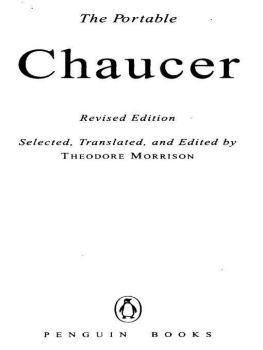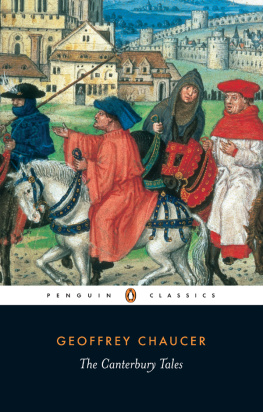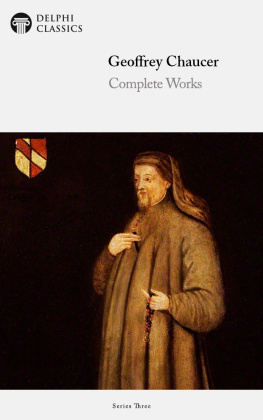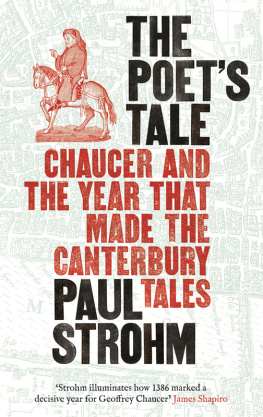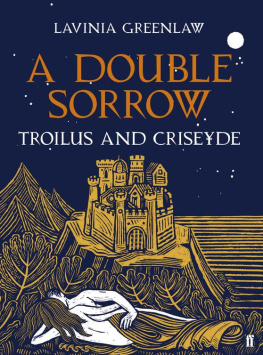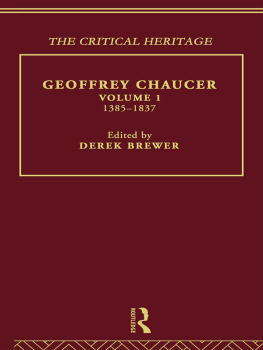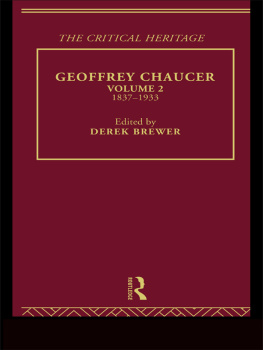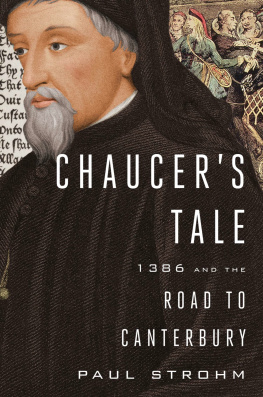Table of Contents
THE VIKING PORTABLE LIBRARY
Geoffrey Chaucer
Geoffrey Chaucer was born in London, the son of a vintner, in about1342. He is known to have been a page to the Countess of Ulster in 1357, and Edward III valued him highly enough to pay a part of his ransom in 1360, after he had been captured fighting in France.
It was probably in France that Chaucers interest in poetry was first aroused. Certainly he soon began to translate the long allegorical poem of courtly love, the Roman de la Rose. His literary experience was further increased by visits to the Italy of Boccaccio on the Kings business, and he was well-read in several languages and on many topics, such as astronomy, medicine, physics, and alchemy.
Chaucer rose in royal employment, and became a knight of the shire for Kent (1385-6) and a Justice of the Peace. A lapse of favour during the temporary absence of his steady patron, John of Gaunt (to whom he was connected by his marriage), gave him time to begin organizing his unfinished Canterbury Tales. Later his fortunes revived, and at his death in 1400 he was buried in Westminster Abbey.
The order of his works is uncertain, but they include The Book of the Duchess, The House of Fame, The Parliament of Fowls, Troilus and Cressida , and a translation of Bothius De Consolatione Philosophiae.
Theodore Morrison was for many years Professor of English at Harvard. His publications include The Serpent in the Cloud, The Devious Way, and The Dream of Alcestis.
Each volume in The Viking Portable Library either presents a representative selection from the works of a single outstanding writer or offers a comprehensive anthology on a special subject. Averaging 700 pages in length and designed for compactness and readability, these books fill a need not met by other compilations. All are edited by distinguished authorities, who have written introductory essays and included much other helpful material.
PENGUIN BOOKS
Published by the Penguin Group
Penguin Group (USA) Inc., 375 Hudson Street, New York, New York 10014, U.S.A.
Penguin Group (Canada), 90 Eglinton Avenue East, Suite 700, Toronto,
Ontario, Canada M4P 2Y3 (a division of Pearson Penguin Canada Inc.)
Penguin Books Ltd, 80 Strand, London WC2R 0RL, England
Penguin Ireland, 25 St Stephens Green, Dublin 2, Ireland (a division of Penguin Books Ltd)
Penguin Group (Australia), 250 Camberwell Road, Camberwell,
Victoria 3124, Australia (a division of Pearson Australia Group Pry Ltd)
Penguin Books India Pvt Ltd, 11 Community Centre, Panchsheel Park, New Delhi - 110 017, India
Penguin Group (NZ), cnr Airborne and Rosedale Roads,
Albany, Auckland 1310, New Zealand (a division of Pearson New Zealand Ltd)
Penguin Books (South Africa) (Pry) Ltd, 24 Sturdee Avenue,
Rosebank, Johannesburg 2196, South Africa
Penguin Books Ltd, Registered Offices: 80 Strand, London WC2R ORL, England
First published in the United States of America
by Viking Penguin Inc. 1949
Paperbound edition published 1956
Reprinted 1958 (twice). 1959, 1960 (twice), 1961 (three times),
1962 (twice), 1963 (twice), 1964 (twice), 1965, 1966 (twice),
1967, 1968, 1969 (twice), 1970 (twice),
1971 (twice), 1972, 1974, 1975
Revised edition published
by Viking Penguin Inc. 1975
Published in Penguin Books 1977
Copyright 1949 by Theodore Morrison Copyright @ Theodore Morrison, 1975, 1977 All rights reserved
LIBRARY OF CONGRESS CATALOGING IN PUBLICATION DATA
Chaucer, Geoffrey, d. 1400.
The portable Chaucer.
Reprint of the rev. ed. published in 1975 by The Viking
Press, New York
Bibliography: p. 49.
I. Morrison, Theodore, 1901- II. Title.
[PR1855.M6 1977] 821.1 77-1097
eISBN : 978-1-101-12595-3
The scanning, uploading and distribution of this book via the Internet or via any other means without the permission of the publisher is illegal and punishable by law. Please purchase only authorized electronic editions, and do not participate in or encourage electronic piracy of copyrighted materials. Your support of the authors rights is appreciated.
http://us.penguingroup.com
To the Memory of F. N. Robinson who patiently read in typescript the original edition of this book and extended every kindness that a leading Chaucerian scholar could show to a former pupil whose importunities he might as easily have dismissed.
Introduction
CHAUCERS TIMES
Geoffrey Chaucer lived in medieval England, which despite its outlying position was bound into the medieval culture of Europe by religion, war, commerce, poetry, philosophy, and science, and by the common institutions of feudalism. This turbulent world rubbed edges with the near and even the far East. Tamerlanes life, as J. L. Lowes points out, just overlapped Chaucers at each end, and ... it was in the year in which Chaucer was appointed Justice of the Peace that the Great Turk boasted that he would make his horse eat oats on the high altar of St. Peters. The peak of the Crusades had long passed, but, to quote Lowes again, Chaucers Knight had fought in Europe, Asia, and Africa against the Moors, the Turks, the Tartars and the heathen of the Northin Turkey, Spain, Prussia, Lithuania (then a Tartar outpost) and Russia, and also with that valorous champion of impossible conquests, Pierre de Lusignan, king of Cyprus, at the taking of Alexandria, and at Lyeys and Satalye. And the Knight was a composite portrait of men whom Chaucer personally knew.
England was engaged during Chaucers lifetime and for some fifty years after his death in the Hundred Years War with France. Chaucer was probably born somewhat later than 1340; he died in 1400. The first celebrated English victory in the war, Crcy. occurred in 1346, and the last, Agincourt, in 1415. Joan of Arc was martyred in 1431, and the final reversal of English fortunes in the struggle began.
The dynastic claims of the English throne to continental territory do not account for the energy that sustained a century of conflict. The Hundred Years War. says G. M. Trevelyan, was the diplomatic and military aspect of the period of transition from the feudal to the national, from the Middle Ages to the Renaissance. The first notable action was the English naval victory at Sluys. Later England lost control of the sea for some fifteen years. Chaucers Merchant, in the Prologue to The Canterbury Tales, wants the sea kept open at all costs between Middleburg, in Holland, and the river Orwell. The contest involved trade, sea power, and middle-class interests. The English land victories were won by abandoning or modifying feudal tactics. The yeoman archers who decided the issue at Crcy and Agincourt against French knights who clung to chivalric arms and tactics came from a population which had not only been allowed but compelled to bear arms. The commoner brought home booty, and the noble brought home his noble French captives, who paid appropriate ransoms to their English hosts, besides dancing, flirting, banqueting, and hawking with them. The war provided outlets for other kinds of ambition also. Chaucers Squire, doing well for one of his age in forays through Flanders and Picardy, hoped to stand the better in his ladys grace.
The war was accompanied by landmarks of social change at home. In 1348-49, the Black Death reduced the nation in sixteen months from perhaps four million to perhaps two million five hundred thousand, and precipitated the class struggle, in Trevelyans phrase, since the market value of labor had been doubled at a stroke. Free laborers demanded better wages; peasants bound to compulsory labor on the estates of their feudal overlords began to struggle for freedom. But while farmlafid was going back to wilderness, the war went on, still regarded as a source of plunder and profit. Poitiers followed Crcy, says Trevelyan, as though half the world had not died in the interval. In 1381, the resentments and the improved bargaining power of feudal labor broke out briefly in the Peasants Revolt. Wat Tyler led contingents of the rebels to London, where they killed the Archbishop of Canterburya tribute to the secular power of the church and its position in the social and economic structure. They also attacked the Flemish weavers who had been brought in to help develop English cloth making, evidently looking on them as unwelcome competitors; They dispersed after two meetings with the young king Richard, at which he promised concessions he did not mean to carry out, and at the second of which Wat Tyler was killed, together with his lieutenant Jack Straw (unless the latter was a contemptuous name for Tyler himself).


